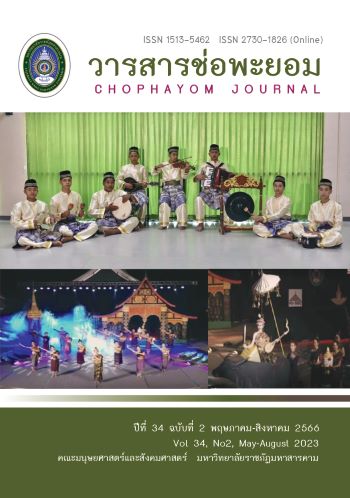Core Competencies to Continuous Employment of Tour Guide in The Southern Region After The COVID-19 Pandemic
Keywords:
Tour Guide Service, Core Competencies of Tour Guide, After The COVID-19 PandemicAbstract
Tour guide services are very important to the tourism industry in Southern Thailand for providing quality service and creating a good travel experience. The employment after reopening the country after COVID-19 is very important for who consider the knowledge and competence of guides to suit the assigned tasks. Skills of tour guides after the COVID-19 situation from interviews with guides in working areas of 3 provinces, 1) Krabi, 2) Phuket, and 3) Surat Thani, 25 people were studied and synthesized from qualitative research on the importance of tour guides and giving service includes the physical nature of tour guides in providing excellent service. It was found that providing the best tour guide service is a guided tour that has been planned in advance, with good communication and relationship building friendly service, gentleness, and respect for each other. Therefore, it is very important to prepare the tour guides to be ready to serve in the modern era, especially by providing the actual pre-work experience from the training format. The professional experience of students of tourism and service personnel who aim to work as tour guides is important. Increasing guide skills during work as well as there are reflections from service. After work can make guides develop continuously. Keywords: Tour Guide Service, Core Competencies of Tour Guide, After The COVID-19 Pandemic
References
กรมการท่องเที่ยว. (2566). สถิติการท่องเที่ยว. สืบค้นเมื่อ 13 พฤษภาคม 2566 จาก https://www.mots.go.th/more_news.php?cid=564.
กระทรวงการท่องเที่ยวและกีฬา. (2562). รายงานภาวะเศรษฐกิจการท่องเที่ยวไตรมาส 3/2562. สืบค้น 22 สิงหาคม 2566, จาก https://www.mots.go.th/download/Tourism EconomicReport/3Presentation Tourism Economic.pdf.
กองเศรษฐกิจการท่องเที่ยวและกีฬา. (2563). ข้อมูลด้านการทางท่องเที่ยว. สืบค้นเมื่อ 22 สิงหาคม 2566, จาก https://secretary.mots.go.th/policy/more_news.php?offset=0&cid=26&startoffset=0.
บัญชีประชาชาติด้านการท่องเที่ยว. (2562). รายงานภาวะเศรษฐกิจการท่องเที่ยวไตรมาส 3/2562. สืบค้นเมื่อ 9 พฤษภาคม 2566, https://www.mots.go.th/download/TourismEconomicReport/.
Abdullateef, A. O., & Olyaiyekan, F. A. (2020). The Impact of Hospitality Service Quality on Customer Satisfaction: A Study of Hotels in Sokoto State, Nigeria. Journal of Tourism and Hospitality Management, 8(1), 1-10.
Anh Thi Van Pham and Huong Thi Thu Dao. (2021, October). The Importance of Soft Skills for University Students in the 21st Century. In Proceedings of the 4th International Conference on Advances in Artificial Intelligence (ICAAI '20). Association for Computing Machinery, New York, USA, 97–102. [DOI: https://doi. org/10.1145/3441417.3441430].
Braun, V., & Clarke, V. (2006). Using thematic analysis in psychology. Qualitative Research in Psychology, 3(2), 77–101. [https://doi.org/10.1191/1478088706qp063oa].
Elliot, A. J. (2005). A Conceptual History of the Achievement Goal Construct. In A. J. Elliot & C. S. Dweck (Eds.), Handbook of competence and motivation (pp. 52–72). Guilford Publications.
Flick, U. (2018). An introduction to qualitative research. Los Angeles; Sage Publications.
Guest, G., Bunce, A., & Johnson, L. (2006). How many interviews are enough?: An experiment with data saturation and variability. Field Methods, 18(1), 59-82.
Horváth, V. and Kenesei, Z. (2023). Employee experience journey mapping. A new approach to attracting talent in the tourism sector in the shadows of COVID-19. Tourism and Hospitality Management, 29 (2), 207-217. [DOI: https://doi.org/10.20867/thm.29.2.5]
Kim, D., & Park, J. (2020). The impact of hotel employees’ emotional intelligence on emotional labor and job satisfaction. International Journal of Hospitality Management, 87, (1),13-24.
Kuo, Y. F., Wu, C. M., & Deng, W. J. (2009). The relationships among service quality, perceived value, customer satisfaction, and post-purchase intention in mobile value-added services. Computers in Human Behavior, 25(4), 887-896.
Li, Y., Gu, X., & Chen, Q. (2020). Effects of perceived organizational support on turnover intention among hotel employees: The mediating role of job satisfaction. Journal of Hospitality and Tourism Management, 43, 10-18.
Nunnally, J.C. & Bernstein, I.R. (1994). Psychometric theory, Ed.ke-3. New York; McGraw-Hill.
Oztürk, A. B., & Bilgin, M. H. (2021). The effect of human resource management practices on service quality: The case of five-star hotels in Istanbul. Journal of Human Resources in Hospitality & Tourism, 20(1), 18-41.
Pallant, J. (2001). SPSS survival manual - a step by step guide to data analysis using SPSS for windows (version10). London; Buckingham Open University Press.
Phamornsiritrakul, P. & Sucher, W. (2019). Competency Scale Development of Tourist Guides (General Foreign). Veridian E-Journal, 12(3), 591-612.
Saunders, M.N.K., Lewis, P. and Thornhill, A. (2019). Research Methods for Business Students. (8th Edition). New York; Pearson.
Smith, J. A., & Osborn, M. (2008). Interpretative phenomenological analysis. In Smith, J. A. (Ed.), Qualitative psychology: A practical guide to research methods (pp. 53-80). Los Angeles; Sage Publications. UNTWO. (2020). UNWTO WORLD TOURISM BAROMETER. Retrieved July 1, 2023, from http://www.unwto.org/facts/eng/pdf/barometer/UNWTO_Barom09_2_en.pdf.
Downloads
Published
How to Cite
Issue
Section
License
Copyright (c) 2023 Chophayom Journal

This work is licensed under a Creative Commons Attribution-NonCommercial-NoDerivatives 4.0 International License.






